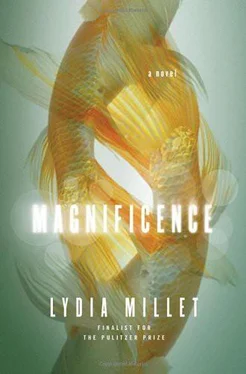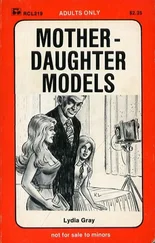“Then we should wait till tomorrow to go in?”
He fished in a baggy pants pocket for what turned out to be a soft pack of Camels, so badly crumpled the cigarettes should be broken.
“We need to get the dirt back a ways from the opening, make sure it’s not going to fall in and collapse the thing. I can’t vouch for how safe it is even after we do that, though. That shit’s not my deal. You need to get some kind of professional in to reinforce it or test it or whatever before anyone tries to go in there.”
“But can you at least move the dirt out of the way now? So you don’t have to come back? Or is it already too dark for that?”
He flicked his lighter and lit up and she asked him for one, leaned in close so he could light it for her. After they both inhaled he shrugged and then nodded and blew out his smoke. “We got another forty-five minutes easy.”
She watched as he stubbed out his cigarette and climbed back into the digger. He pulled a lever and crunched a gear or two and the yellow arm behind the cab rose off the ground: JCB,read the black letters on the side. It was a claw, though she didn’t know if that was the official name. She went back to the house as he started rolling, got herself a bottle of beer from the refrigerator and brought it out to drink while she watched. She looked down at the dirt, at the tracks the backhoe left in the loose piles and in the sparse grass that was flattened beneath the tires; she looked up at the light in the canopy of the trees.
It was a light she’d seen a hundred times before — a light she knew from cinematography as well as from life, a certain familiar watery flutter of sun through high-up openings in the leaves. The way it slanted down, the way it wavered through the blur of green, conferred a sense of a life unmoving yet slowly filtering memories — waiting, existing without a sign of change in the long, semi-bright moment before dark.
•
When he drove the backhoe away and her front gates closed behind him it was dusk.
Jim wasn’t coming; he had stayed late at work and she would see him later at the restaurant — a famous, touristy place where the Chinese food was bland and greasy but the good tables had an unparalleled view, on a verandah high on a hillside, overlooking the valley.
She scrounged around in the kitchen drawers till she found a flashlight with live batteries and took it out to the hole in the yard. The soil had been smoothed back and she stood a few inches from the edge, pointing the flashlight down into the hole. She saw the metal rungs of the ladder and could make out, on the walls of the tunnel, a pattern of brickwork. She didn’t think it was deep; she thought she could make out the bottom, a dim, flat floor.
If the bricks collapsed, no one would know where she was. She stood still, hesitating.
In front, headlights scoped around and then cut off as a car turned into the drive. It was someone who had the gate remote. She stood with her flashlight pointed at the house, listening. A couple of car doors slammed faintly.
The old ones had returned.

They left Angela with Ellen Humboldt in the kitchen, heating up microwave dinners: chicken with small cubes of carrot, Susan noticed, which resembled the rehydrated food of astronauts or recalled the gray airplane upholstery of economy flights to Pittsburgh. Angela had once been a good cook but these days she was catering to Ellen, who preferred to eat small portions of highly processed frozen entrees. Portia and the gray lady came outside with Susan — the gray lady whose name, she realized, had been told to her enough times now that she could never ask again. She would have to listen slyly to the others until she caught it.
“So where do you think it could lead?” asked Portia, carrying her own flashlight.
There were footlights along the path, but once they came to the end of the flagstones and into the dark of the trees they needed the spots of light at their feet.
“Maybe down to an old cellar, at least,” said Susan. “On the original plans there was a basement and a wine cellar. But it’s so far from the house, Jim says there’s no way.”
“It would be better to wait till morning,” said Portia.
“I’m just going to take a quick look,” said Susan. “That’s all. Just to see what it is. Then I’ll come up the ladder again.”
She knelt next to the hole, her flashlight in a back pocket, as the lades focused their beams on the first rung of the ladder. She stretched a foot back and felt for the bar.
“What if the ladder’s unstable?” asked Portia. “You could fall down and break your neck.”
“It’s not that deep,” said Susan. “Maybe twelve feet. Maybe fourteen.”
She looked up at their faces, relieved to see that the gray lady was nodding.
“Hold on to my hand till you get down a ways,” said Portia, and reached out to Susan, who grabbed it.
“Here goes,” she said, and put her weight on the top rung. It held; it was solid. Down to the second, the third, the fourth, until she could let go of Portia’s hand and grab the top rung with both of her hands. Their flashlight spots glanced off the bricks, into her face when she looked up, blinking, and then away again. A few seconds later she felt hard ground beneath the leading foot, stepped onto it and switched on her own flashlight.
“Concrete floor,” she called up as she turned. Her magnified voice echoed.
“What do you see?” asked Portia.
“A door,” she said. She stood in a kind of simple well, nothing to see but the bricks around her, the cement beneath her feet and the gray of the door.
It was metal, with a key lock. She felt a sinking disappointment but reached out anyway and grabbed the knob — gritty with dust, but it turned without stopping and she felt the mechanism click. She pulled it toward her and it gave; cold air swept in. Ahead there was a hallway with the same concrete floor and brick walls. The end of it was too dark to see, but it seemed to lead back toward the house.
“Give me five minutes,” she yelled, turning her face up so that the old ladies were sure to hear.
“I warn you, after that it’s 911,” said Portia. “Because we’re not standing here all night, and I’m certainly not coming down.”
Susan pointed her beam at the narrow hallway’s ceiling: a naked bulb with a dangling cord. That meant it was wired. She reached up and pulled: nothing.
Maybe the bulb was out, she thought, and kept walking.
The hallway turned and she faced another door — nothing but that. It was just like the first and like the first it opened. She pulled it all the way back until it scraped the wall beside her and stopped; she stepped in. And here she was, in her own basement.
It was a gray, industrial space, almost clinical. There were old pipes along the ceiling, dusty and utterly dry, bearing no beads of moisture; there was the same gray cement floor, stretched out from where she was standing. In rows stretching along the far walls, and then spaced neatly between them like library stacks, were banks of metal cabinets that looked like high school lockers, and between them aisles with enough space to walk. There was the thick smell of mothballs and also something else — a chemical scent she couldn’t identify.
It was surprisingly dry. She scoped her flashlight around again, looking for another lightbulb, and finally saw a switch on the wall. After she flicked it there was a pause, then a series of clicks and flickers and the overhead fluorescents went on, long bulbs in the ceiling, mostly out of sight beyond the tops of the cabinets. They cast a sickly, clinical light. She turned off her own. Other than the closed cabinets everywhere she noticed only one other element: sacks marked with printed words, lying along the tops of the cabinets and piled on the floor at their ends. She leaned down to the pile nearest her and read the words on the bags: SILICA GEL MIXTURE. DESICCANT.
Читать дальше













